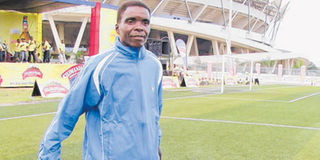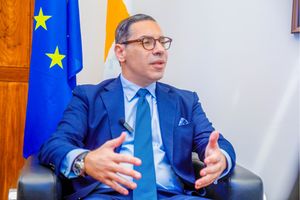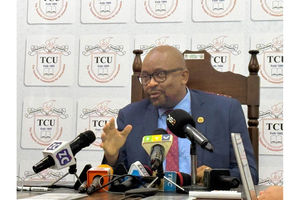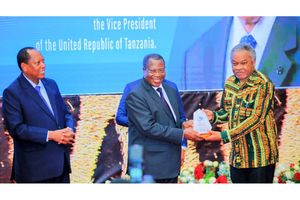We beat Zambians at own turf, before Kaunda, says Tino

Former national soccer team and Pan African striker Peter Tino as he looks now. He played a key role for Tanzania’s qualification for the 1980 Afcon finals. PHOTO| SAID KHAMIS
What you need to know:
- Some Kariakoo residents in Dar es Salaam, one of the busiest spots in the city, had sought refuge in the shades of high rise buildings.
- A man in his 60s, in a dark blue trouser, a white T-shirt and sandals, stood at one of the buildings adjacent to Msimbazi Street, watching motorists struggle in the traffic jam, each determined to move ahead.
Dar es Salaam. It was Saturday afternoon and the sun was blistering hot.
Some Kariakoo residents in Dar es Salaam, one of the busiest spots in the city, had sought refuge in the shades of high rise buildings.
A man in his 60s, in a dark blue trouser, a white T-shirt and sandals, stood at one of the buildings adjacent to Msimbazi Street, watching motorists struggle in the traffic jam, each determined to move ahead.
He seemed to be oblivious of the scorching heat. After moving closer to him, I noticed that he was a bit different from the flamboyant image he used to present during his heyday.
This was none other than Augustine Peter, popularly known during his good old days as Peter Tino, one of the best strikers Tanzania has ever produced.
Tino was a household name in many soccer-loving families during his five-year ‘reign’, beating defenders almost at will in both domestic and international competitions.
From the place he stood, one could see petty traders manoeuvre their way between vehicles, wooing motorists, passengers and passers-by to buy their wares.
But for Tino, such ‘opportunities’ are rare because he stays at Vingunguti, Ilala District in Dar es Salaam, about 6 kilometres from Kariakoo.
When I asked him, during our conversation, to recall the fondest memory of his career, the charming Tanzanian football legend cited a trip he made with the national soccer team, Taifa Stars, to Ndola, Zambia in 1979 for a continental assignment.
It was a crucial Africa Cup of Nations qualifier against Zambia’s national soccer team, KK Eleven, drawing its name from the founding President of Zambia, Kenneth Kaunda.
Kaunda was then considered Zambia’s fan number one of the Southern African country’s national soccer team.
And whenever KK Eleven played against a foreign team in Zambia, he would always attend the match unless he was outside the country on official business.
“KK Eleven, who had lost 1-0 to Taifa Stars in the first leg tie of the final qualifying round of the Afcon in Dar es Salaam a fortnight earlier, were all out for a victory so as to appease disgruntled Zambians,” recalls Tino, smiling.
One of the soccer fans who turned up at the Dag Hammarskjoeld Stadium in Ndola to cheer KK Eleven on November 11, 1979 was, of course, President Kaunda.
Taifa Stars, on the other hand, needed just a draw of any margin in the return leg clash to sail through.
Five minutes to time, the score stood 1-0 in favour of the hosts, and it appeared Taifa Stars were done.
The Zambians, enjoying a friendly home support, were now looking for a winning goal that would take them to the Nations Cup finals.
But just when it appeared it was a matter of time for KK Eleven to get the match-winner, Tino, in his typical predatory style, appeared from nowhere to snatch the much-needed equalizer for Taifa Stars.
The goal scored a few seconds to time, dislodged from the depths of depression to the pinnacle of ecstasy.
Sashaying with elegance into the Zambia team’s danger zone, Tino, then a young and towering forward, sneaked between two defenders just outside the penalty box to unleash a thunderbolt that gave goalkeeper Vincent Chileshe no chance.
The draw earned the Tanzanian boys a ticket for their first ever appearance in the Africa Cup of Nations finals in Lagos, Nigeria.
This historical feat was, of course, achieved through team effort. But it was impossible to keep out Tino’s name from the headlines.
Taifa Stars did not impress in the Lagos finals. They did not go beyond the group stage. However, they won many a heart for the artistic way they approached the game.
The other members of the squad that competed in the 1980 finals include goalkeepers Juma Pondamali and Athuman Mambosasa; defenders Leopard Tasso Mukebezi, Mohamed Kajole, Jella Mtagwa and Leodgar Tenga.
Also on the list were Adolf Rishard, Omari Hussein, Hussein Ngulungu, Mohamed Salim, Thuwen Ally and Ahmed Amasha to mention but a few.
The 1980 Afcon finals featured eight teams, which were put in two groups of four sides each. In the final, hosts Nigeria beat Algeria 3−0.
It is tragic that, after such a prestigious feat, the standard of football in Tanzania has declined to an alarming rate.
Taifa Stars’ Afcon campaign has always seen the country being bundled out in the first or second round of the preliminary stages of the qualifying matches.
Tino, born in 1956 at Kariakoo in Ilala District, Dar es Salaam, attributes the slump to lack of seriousness and commitment on the part of both the youth and sports administrators.
“The youth have many distractions. The pursuit of pleasure and economic survival compel them to prefer running businesses and other activities to the sport,” the former Tanzanian international says.
Asked to name players who impressed him during his prime time, Tino named former Pan African midfielder Adolf Rishard.




